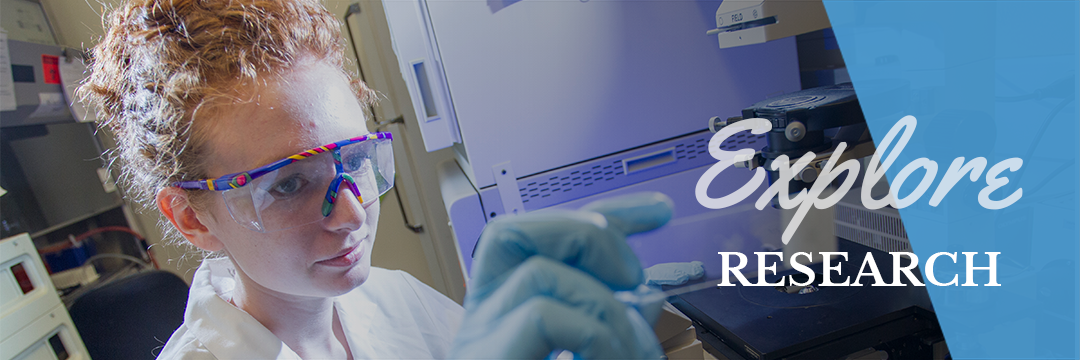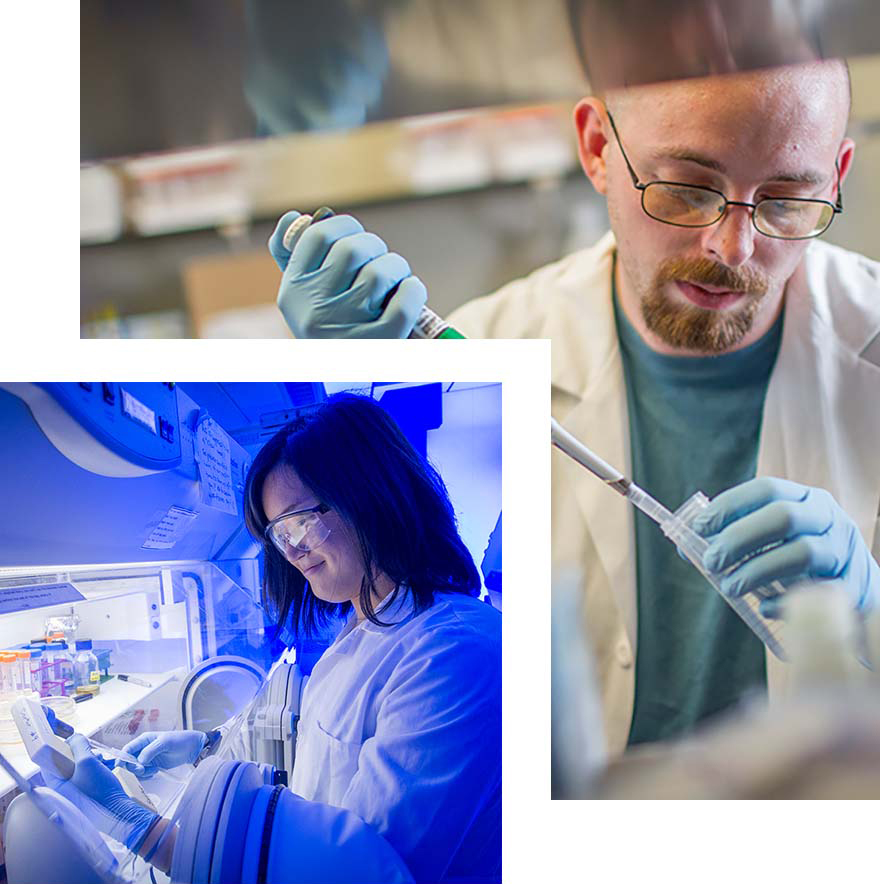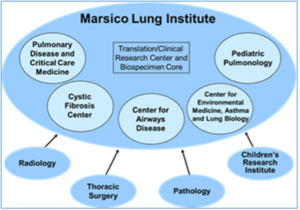Research

The Division of Pulmonary Diseases and Critical Care Medicine is recognized for its outstanding research programs directed by leading investigators. A wide range of approaches, including basic, translational, clinical, epidemiological, social and behavioral studies, are creatively utilized to address both common and rare pulmonary diseases that afflict people in our state, the country and worldwide. The investigators are supported by outstanding resources in their laboratories, the Marsico Lung Institute, the School of Medicine’s core facilities and centers, and the hospitals and outpatient services provided by UNC Health. Our goal is to develop therapies and improve the lung health of North Carolinians and the world through our research efforts. The focus areas and the investigators who lead research programs within these areas are described below.
Clinical Trials
As academic clinicians, we perform research that moves patient care forward, including clinical trials that look at new ways to prevent, diagnose, and treat disease. Volunteers may participate for the opportunity to receive cutting-edge treatments for specific conditions, and to help others. Explore our searchable database to find clinical trials in the Department of Medicine.
Find Clinical Trials
Focus Areas
Our nationally and internationally recognized researchers have interests that span the full spectrum of pulmonary diseases. The following are particular areas of emphasis:
Chronic obstructive pulmonary disease (COPD) remains one of the major causes of death and disability in the United States and globally. The UNC Pulmonary Division includes leading researchers investigating determinative factors in COPD development, disease progression and treatment. Investigators from the Marsico Lung Institute are defining key aspects of COPD biology including the role of the airway surface liquids and airway epithelial cells in COPD pathogenesis as well as inflammatory and innate immune processes underlying cigarette-smoke induced lung disease. UNC is the collaborative studies coordinating center for the Subpopulations and Intermediate Outcome Measures In COPD Study (SPIROMICS), one of the largest prospective studies evaluating phenotypic, biomarker, genetic, genomic, and clinical data from patients living with COPD. Our clinical investigators conduct translational and pharmacologic studies focused on understanding mechanisms of COPD phenotypes in both exposure and genetic (alpha-1 antitrypsin deficiency) COPD as well as new drug treatments. Pulmonary investigators also collaborate closely with colleagues in UNC’s Division of Infectious Diseases, UNC’s Gillings School of Public Health and the UNC Center for Environmental Medicine, Asthma and Lung Biology to study COPD epidemiology, mechanisms and treatment.
Affiliated investigators: Richard Boucher, Claire Doerschuk, Bradley Drummond, Ashley Henderson, Wanda O’Neal
The UNC Bronchiectasis/NTM Care and Research Center focuses on bronchiectasis and the chronic and recurring airway infections associated with this disease including nontuberculous mycobacteria (NTM). Researchers are interested in understanding genetic causes such as primary ciliary dyskinesia as well as mechanical and environmental factors contributing to the development of bronchiectasis, host susceptibility to nontuberculous mycobacteria and management optimization strategies for treating these conditions. Clinical studies include participation in the US Bronchiectasis Registry, Genetic Disorders of Mucociliary Clearance Consortium protocols and clinical trials directed at development of novel therapeutic approaches for nontuberculosis mycobacterial treatments.
Affiliated investigators: Leigh Anne Daniels, Scott Donaldson, Michael Knowles, Kunal Jakharia, Kenneth Olivier, Maimoona Zariwala
The UNC Adult Asthma Program conducts basic research and clinical trials to help advance knowledge and management of asthma in adults. These trials include: a severe asthma patient registry (CHRONICLE), digital health studies, biologic medications, and population health among others. Laboratory research programs include those centered on mast cell biology, mechanisms of ozone-induced asthma exacerbation and the role of BPIFA1 in asthma pathogenesis.
Affiliated investigators: Carla Ribeiro, Stephen Tilley
The UNC CF Center is a recognized leader in the science of cystic fibrosis, with activities that span from basic laboratory to patient-oriented. The Marsico Lung Institute (hyper link here to Marsico website) is the academic home for a large number of researchers who are focused on the basic causes and treatment of CF lung and gut disease. Patient-oriented research is also a high priority at the UNC CF Center. We conduct single center studies that address important topics, such as the development of new tests that are designed to speed up drug development and help us learn more about CF lung disease in patients. We also participate, and often lead, multicenter clinical trials of new CF therapies. In this era of rapidly advancing CF therapeutics, teamwork is critical. Patients with CF are the center of this team – and we strive to involve as many patients as possible in studies that will move new therapies closer to approval for all CF patients.
Affiliated investigators: Richard Boucher, Brian Button, Leigh Anne Daniels, Scott Donaldson , Jennifer Goralski, Michael Knowles, Silvia Kreda, Wanda O’Neal, Scott Randell, Carla Ribeiro, Subha Sellers
The UNC Interventional Pulmonology (UNC-IP) team works with one goal in mind, TO CURE LUNG CANCER. To this end, we work collaboratively with our colleagues in the Lineberger Comprehensive Cancer Center to develop and improve the minimally invasive diagnosis and treatment of lung cancer. Through an active clinical research endeavor, we have developed a comprehensive lung cancer biorepository and are investigating the immune response to novel lung cancer therapies. In addition, UNC-IP is engaged in developing and evaluating minimally invasive devices, techniques, and therapies for malignant and nonmalignant airway, lung, and pleural diseases. Specific areas of research include device development and evaluation including robotic bronchoscopy, local novel cancer therapy delivery, novel imaging techniques, and the treatment of immune therapy related lung toxicities. UNC-IP has also spearheaded the development of the Carolina Center for Pleural Diseases, a comprehensive multidisciplinary team of clinicians and researchers whose goal is to better understand the mechanisms of pleural lung and breast cancer metastasis and to develop new adaptive cellular therapeutic treatments of disease. There are a number of active studies and registries that we participate in. For more questions, please contact our study coordinator Ashley Delgado, 919-445-0367.
Affiliated Investigators: Jason Akulian, Cole Burks, Christina MacRosty
The Division has long been recognized for the outstanding contributions of our investigators to epithelial cell biology of both large and small airways. Interests of these investigators include cystic fibrosis, primary ciliary dyskinesia, responses to bacteria such as Pseudomonas, recognition, uptake and response to viruses including SARS-CoV-2 and influenza A, mucin production and secretion, and epithelial cell renewal and repair, as well as the stem cell biology underlying regeneration. Clearance and other functions of the airway epithelium are a major focus and include studies of the development of mucociliary clearance, cilia biology, mucin structure and function, and the presence and effects of the lung microbiome.
Affiliated Investigators:
Richard Boucher, Brian Button, Scott Donaldson, Silvia Kreda, Alessandra Livraghi-Butrico, Kenichi Okuda, Wanda O’Neal, Carla Ribeiro, Scott Randell
The Division includes investigators interested in basic and translational immunology of lung diseases, particularly the innate immune responses that underlie many lung diseases. Research programs focus on the immunological processes and molecular mechanisms underlying lung injury and repair. Studies investigate the immune cell types and their responses in patients with lung disease. Research interests within the Division focus on how the immune cells function throughout lung disease. For example, studies examine how immune cells response early during an infectious process and how immune cells interact with other cell types to promote lung repair. In addition to basic mechanistic studies, ongoing translational research and clinical trials investigate the pathogenesis of lung injury and repair to improve treatments for patients with lung disease.
Affiliated Investigators:
Claire Doerschuk, William Fischer, III, Robert Hagan, Alessandra Livraghi-Butrico, Jason Mock, Kenneth Olivier, Christine Vigeland
Affiliated Investigators: Mazen Al-Qadi, James Ford III, Barbara LeVarge
The UNC Interstitial Lung Disease (ILD) Center includes researchers interested in the pathogenesis, epidemiology, diagnosis, classification, prognosis, and treatment of ILD. We collaborate with local, national, and international colleagues in basic and clinical research. Our basic research focus includes investigations into metabolomics of diffuse lung disease. We have conducted clinical and translational studies concentrating on lung diseases associated with systemic rheumatic disease/connective tissue disease, the rare lung disease Lymphangioleimyomatosis, prognostic biomarkers in Idiopathic Pulmonary Fibrosis (IPF), novel therapeutics including an investigator-initiated clinical trial of lung spheroid stem cell treatment for IPF and observational studies defining risk factors for checkpoint inhibitor pneumonitis. We work in partnership with extramural investigators as members of the Pulmonary Fibrosis Foundation (PFF) Care Center Network and the LAM and Rare Lung Disease Clinic and Research Network.
Affiliated Investigators: Brent Kinder, Jason Lobo, Kunal Patel, Christine Vigeland
Sarcoidosis is a multiorgan disease with significant thoracic involvement and involves a special type of inflammation known as granulomatous inflammation. Researchers within the division are interested in translational research programs to further our understanding of how granulomatous inflammation develops and can be treated through involvement in clinical trials.
Affiliated Investigators: Mazen Al-Qadi, Stephen Tilley
Vasculitis is a multi-organ disease causing inflammation and destruction of vessels and the surrounding tissue that can cause damage in many systems. The lungs are affected primarily by small vessel vasculitides, with anti-neutrophilic cytoplasmic antibodies (ANCA) being the primary vasculitis seen in our multidisciplinary program. Using an active database that has tracked patients with ANCA vasculitis for over 30 years, we have been investigating lung involvement as well as its association with other organs.
Affiliated Investigators: Ashley Henderson
Researchers within the Division collaborate with researchers and clinicians in the Division of Infectious Diseases better understand the association between HIV infection and the pathogenesis and management of non-infectious lung diseases including COPD, asthma, and lung cancer. Ongoing research includes studies in implementation science, epidemiologic evaluation, public health, a biospecimen registry, and clinical trials. Research in HIV-associated lung diseases benefits from existing clinical resources including a pulmonary subspecialty clinic in HIV-associated lung diseases and numerous national and international cohort studies of which UNC is a part of.
Affiliated Investigators: Bradley Drummond, William Fischer III, Subhashini Sellers.
The Division’s programs in viral and bacterial lung infections are nationally recognized and includes shared leadership of the UNC Regional Emerging Special Pathogen Treatment Center with the Division of Infectious Disease. Many clinical trials in patients with COVID-19, MPox (Monkeypox), HIV and other infectious diseases are ongoing. Cell-based therapies using CAR T-cells and regulatory T cells are also underway. Translational studies include a registry of biospecimens and patient information that serves as a resource for identification of biomarkers and mechanistic studies.
Affiliated Investigators: Claire Doerschuk, William Fischer, III, Robert Hagan, Jason Mock, Subhashini Sellers, Christine Vigeland
The UNC critical care research group conducts a range of clinical, basic, and translational research with a goal of reducing ICU morbidity and mortality as well as improving the patient and family well-being during and after recovery. We conduct and participate in clinical trials and observational studies relating to ARDS, sepsis, sedation in the ICU, delirium, and mechanical ventilator liberation/management strategies. We also have a strong interest in outcomes of chronic critical illness and improving emotional outcomes in ICU survivors and their families. Our translational and basic science investigators are conducting research on immune responses to pneumonia including bacterial and viral pathogens, and lung injury and repair. Our group is also interested in emerging pathogens that cause lung injury and critical illness including discovery and testing of new therapeutics as challenges emerge.
Affiliated Investigators:
Adrian Austin, Shannon Carson, Lydia Chang, Claire Doerschuk, Kenton Dover, Robert Hagan, Jennifer Maguire, Jason Mock, Christine Vigeland, Blair Wendlandt
The goal of medical education is to prepare physicians to apply the latest scientific knowledge to promote health, prevent and cure human disease and mitigate symptoms of patient illness as well as remain innovative in how we teach knowledge and skills to learner. The Division of Pulmonary and Critical Care Medicine interacts with learners at all levels of medical training in multiple disciplines, thus the ability to understand and provide the best practices in medical education is imperative. Ongoing areas of research are in curriculum development, self-directed learning tools for pulmonary and critical care education, and ultrasound teaching at all levels of the school of medicine. Our clinician-educators are also very involved in both graduate and undergraduate medical education throughout the school of medicine and serve as mentors for others interested in developing a career in medical education.
Affiliated Investigators:
Ashley Henderson, Kunal Jakharia, Jennifer Maguire, Christina MacRosty, Kunal Patel, Subhashini Sellers
Marsico Lung Institute

The Marsico Lung Institute provides numerous resources for lung research ongoing in the UNC School of Medicine. The Division of Pulmonary Diseases and Critical Care Medicine is one of five major components in the Institute, which also includes the Division of Pediatric Pulmonology, the Cystic Fibrosis and Pulmonary Diseases Research and Treatment Center, the Center for Environmental Medicine, Asthma and Lung Biology, and the Center for Airways Disease. Other critical to the Institute are Lung Radiology, Thoracic Surgery, Pulmonary Pathology, the Children’s Research Institute and the Center for Translational Immunology. The Marsico Lung Institute serves to bring all lung investigators together, sharing resources, conferences and other events.